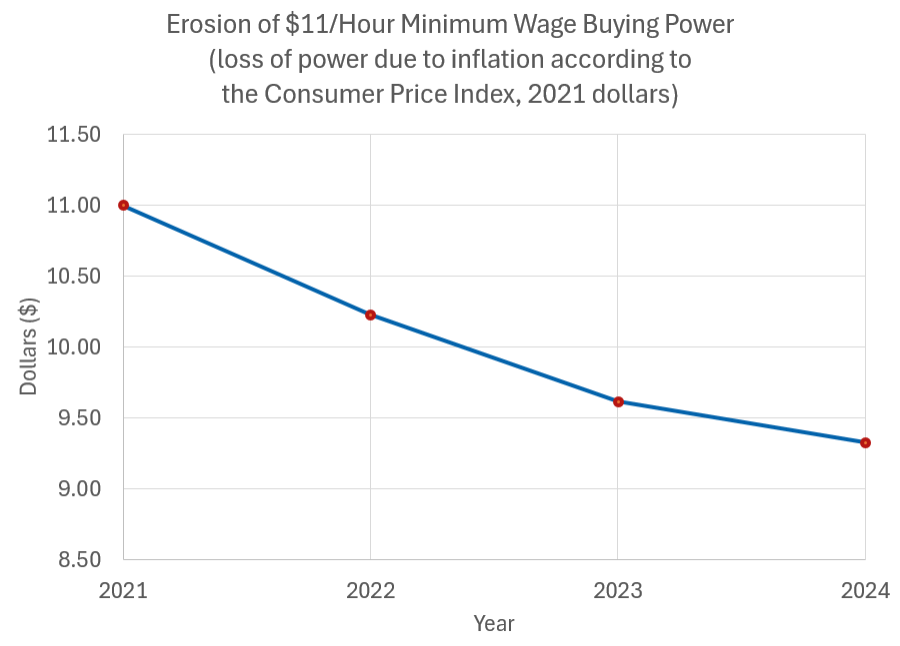
It’s time for the people of Arkansas to once again demand minimum wage increases.
The people of Arkansas have often been leaders on minimum wage increases. However, the current rate of $11 per hour is not enough to lift families out of poverty. It’s time for citizens to once again demand a living wage. And that the minimum wage be tied to the rate of inflation going forward.
As of January 1, 21 states increased their minimum wage. Most did so through an inflationary adjustment. But four states did so through new legislation. And two states, including our neighbor to the north, Missouri, did so through a voter-approved ballot measure. According to the Economic Policy Institute, more than 9.2 million workers will receive a total of $5.7 billion thanks to the wage increases. Women and Black, Indigenous and People of Color (BIPOC), who are disproportionately working minimum-wage jobs, will especially benefit.. One in five affected workers are in families below the poverty line.
The first legislated minimum wage in Arkansas was $1, implemented by the state in 1969. Between then and 2006, the Arkansas minimum wage was raised 22 times by legislative action, maxing out at $6.25 per hour. In 2009, Arkansas was one of three states with a minimum wage below the federal minimum wage, which became $7.25 that year.
In an act of popular democracy in November 2014, Arkansans voted to increase the state’s minimum wage. The ballot measure, a citizen-initiated state statute, was approved by 65.9% of voters. Issue 5, or the Arkansas Minimum Wage Initiative, increased the minimum wage in stages: to $7.50 in 2015, $8.00 in 2016, and $8.50 in 2017. At the time of the vote, only six states – California, Connecticut, Hawaii, Oregon, Vermont, Washington – had a minimum wage above $8.50.
In 2018, once again through a citizen-initiated state statute, Arkansans approved increases to the state minimum wage. Also known as Issue 5, the Minimum Wage Increase Initiative was approved by a slightly larger margin, 68.5% of the voters. The initiative again phased in minimum wage increases: to $9.25 in 2019, $10.00 in 2020, and $11.00 in 2021 (where the Arkansas minimum wage currently stands).
Is the Arkansas minimum wage of $11 per hour sufficient? Of the 30 states that have a legal minimum wage different from the federal minimum wage, only three – Montana, Ohio, and West Virginia – have a lower minimum wage, according to the U.S. Department of Labor.
Comparing the minimum wage to the official Federal Poverty Level offers important insight. An Arkansan making $11 per hour and working 40 hours a week makes just under $23,000 a year. In 2025, the Federal Poverty Level for a family of two is $21,150. Therefore, the Arkansas minimum wage just lifts a family of two out of poverty. In 2018, when voters approved the graduated increase to $11, $23,000 lifted a family of three out of poverty. Thanks to inflation, this is no longer the case.
Further, most Arkansans would agree it is difficult for a family of two to thrive on $23,000 per year. A better estimate that accounts for basic necessities is provided by United for ALICE, a focus of the Arkansas Asset Funders Network and other partners in the state. ALICE, which stands for “Asset Limited, Income Constrained, Employed,” accounts for the cost of living in Arkansas and indicates that a “survival budget” of $38,856 is needed for a family comprised of one adult and one child. This budget increases to $43,080 if that same family needs to secure childcare services. Put another way, the child’s mother or father needs to make $19.43 to $21.54 per hour to meet expenses, nearly twice the current $11 minimum wage.
The arguments against raising the minimum wage are mostly unfounded. Researchers at the Economic Policy Institute determined that most studies of minimum wage increases found little or no job loss. Further, minimum wage increases lead to minimal increases in inflation or consumer prices (for example, see the studies from the W.E. Upjohn Institute for Employment Research and the National Bureau of Economic Research). Economists at the Federal Reserve Bank of Kansas City found that increasing the minimum wage may drive economic growth.
As the Arkansas General Assembly is unlikely to raise the state minimum wage, it is once again time for the people of Arkansas to lead by increasing the minimum wage through direct democracy, the ballot-initiated state statute. This time it is imperative that the statute include automatic increases based on inflation, so that the wage keeps up with cost-of-living increases (to avoid erosion of buying power as demonstrated in the figure below).

According to U.S. Census American Community Survey estimates, more than half a million Arkansans between the ages of 18 and 65 made between $1 and $23,000 in 2023. While some of these workers may not have worked full-time, an increase in the official state minimum wage would help almost all of them. And grow the Arkansas economy at the same time.
